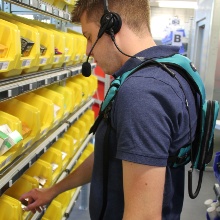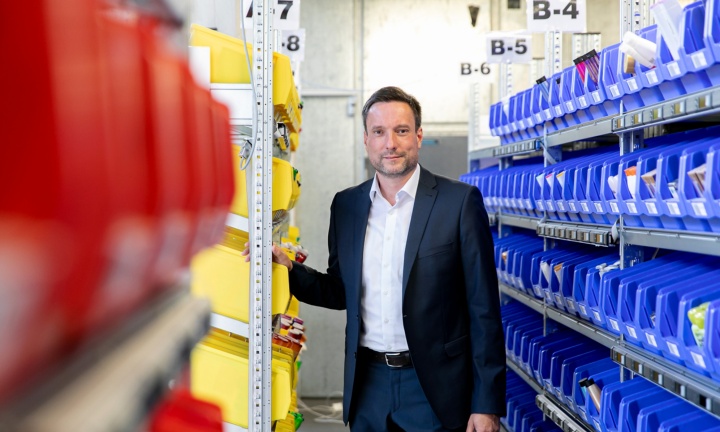Test facility: LernLager for order picking
Despite increasing automation and ultra-modern warehouses, it is impossible to imagine logistics and especially order picking without people. The reasons are the high flexibility and the low investment costs of person-to-goods order picking.
In order to identify the consequences of the human factors involved, the IFT set up an experimental warehouse (LernLager) in 2016 with research, teaching and training approaches for manual order picking purposes. The warehouse was established in cooperation with the project partners SSI Schäfer, Topsystem, Picavi, Datalogic and L´Oréal and occupies a total area of 120 m2, supplying 1,000 storage spaces. Starting from the workstation, the test person has the option of picking with a picking trolley. All the items to be picked were provided by the cosmetics manufacturer L´Oréal and are supposed to be used as test objects and intended to analyze individual processes related to man-to-goods picking. The different sizes and weights of these items reproduce a realistic picking situation. The LernLager offers an ideal opportunity to illustrate, analyze and optimize picking processes in a practical laboratory environment, especially for small and medium-sized businesses that cannot afford their own experimental laboratories.
In addition to the traditional man-to-goods picking approaches, the IFT’s LernLager integrates the following technologies: pick-by-scan (Datalogic / ProGlove), pick-by-light (SSI Schäfer), pick-by-voice (top system) and pick -by-vision (Picavi).
Research Projects
The successfully completed research project LernLager, which was funded by the AiF, was focused on the evaluation and optimization of individual learning processes in intralogistics, using manual picking as an example. For this purpose, a series of picking technologies (such as pick-by-scan, pick-by-light, pick-by-voice and pick-by-vision) in combination with different learning packages (LernPaket) were examined during this research, in order to prepare the test person for upcoming tasks. A LernPaket is based on the combination of different learning methods, which should ensure a successful learning process. Three learning packages were tested in this project, where the developed form of the classic instructed method (CAPT: Cognitive Apprenticeship and Peer Tutoring), an e-learning application on a tablet and virtual reality were employed at the same time. These learning packages were tested in studies and workshops together with suitable companies for manual picking. The results were summarized in the shape of a practical guide for these companies.
Two ZIM-Projects are currently dealing with the optimization of different systems in the manual picking. The ARKom-Project is implies the development of a pick-by-augmented-reality system, while the FlexLight-Project enhances a new, flexible, robust and inexpensive pick-by-light system. Both projects are related to manual picking and are focused on small and medium-sized enterprises.
Training: Picking based on scientific and practical aspects
The IFT, as part of the University of Stuttgart, also offers a wide range of courses for students from technical and business courses, in addition to research and training. As part of the logistics module and business management as technical specialization, the lecture Distribution Center is being held. Student research projects, internships and academic support activities are implemented with help of the LernLager. The LernLager also offers IFT employees, partners and students a wide range of experimentation.
If interested, please contact Mr. Daniel Mezger.
Contact

Daniel Mezger
M.Sc.Humans in logistics




